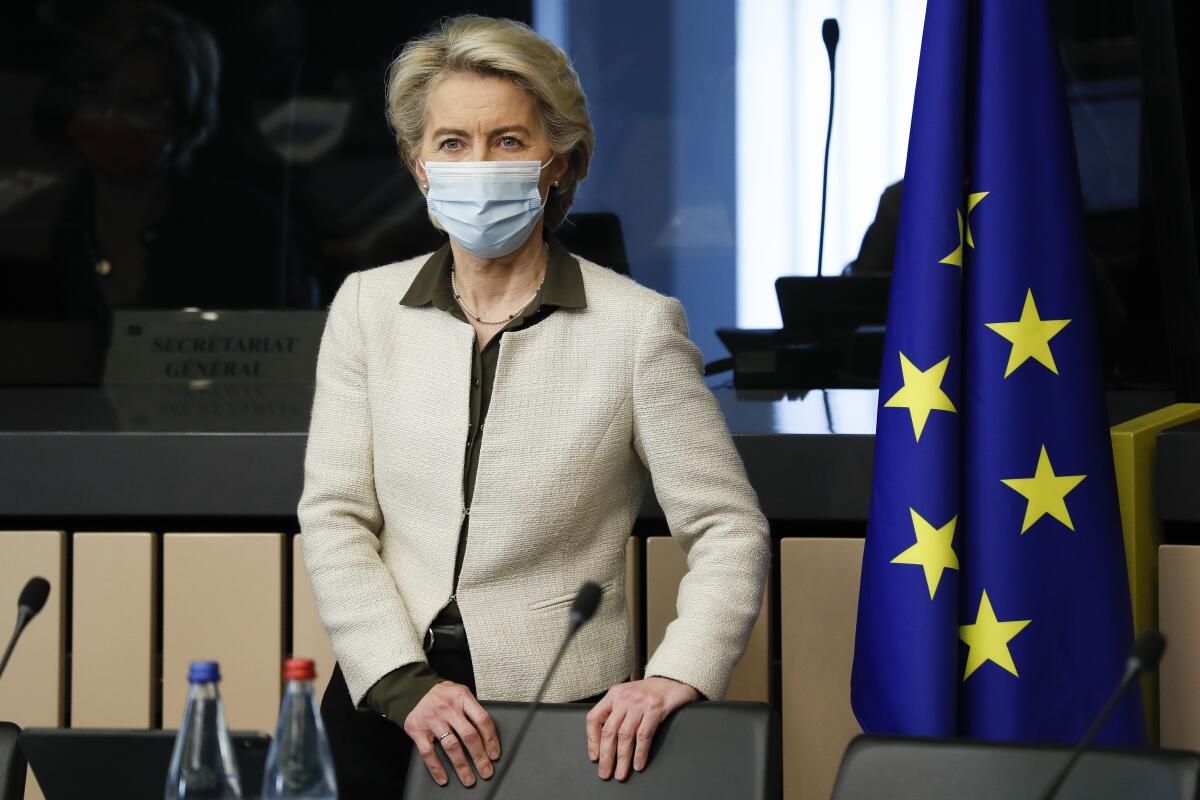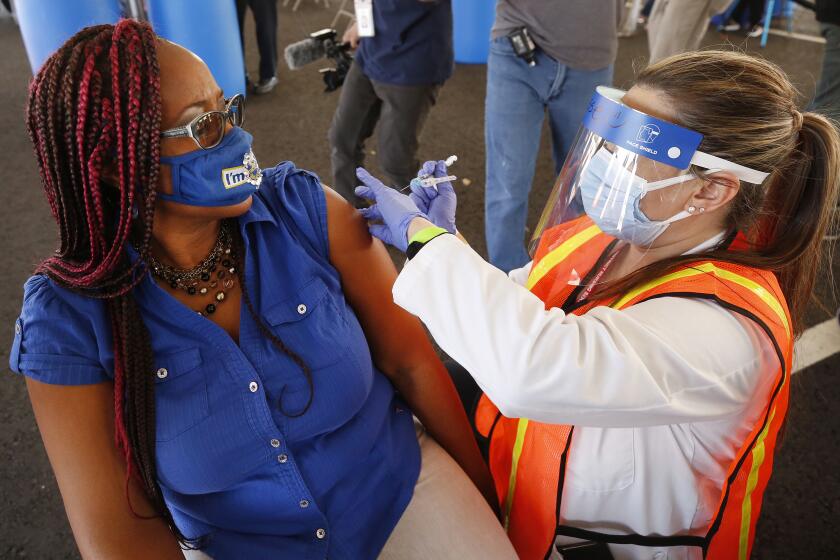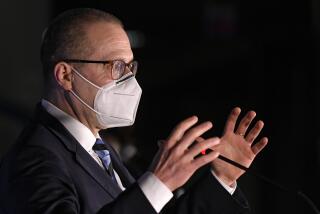Omicron variant expected to dominate in Europe by mid-January

BRUSSELS — The head of the European Union’s executive branch said Wednesday that Omicron is expected to be the dominant coronavirus variant in the 27-nation bloc by mid-January, amid concerns that a dramatic rise of infections will leave Europe shrouded in gloom during the festive season.
European Commission President Ursula von der Leyen said, however, that the bloc was well-prepared to fight the Omicron variant, with 66.6% of the EU’s population of about half a billion now fully vaccinated against COVID-19. Von der Leyen expressed disappointment that the pandemic would again disrupt year-end celebrations but said she was confident the EU had the “strength” and “means” to overcome COVID-19.
“Like many of you, I’m sad that once again this Christmas will be overshadowed by the pandemic,” Von der Leyen said.
That EU figure for vaccinations obscures the fact that some EU nations such as Portugal and Spain have very high vaccination rates, whereas others lag far behind. Bulgaria has just 26.6% of its people fully vaccinated, according to the European Center for Disease Prevention and Control.
Continental Europe can look to Britain, which is no longer a member of the EU, for a sense of what lies ahead as Omicron spreads. British officials say it will be the dominant coronavirus strain in their country within days. The head of the U.K. Health Security Agency, Dr. Jenny Harries, said Omicron was showing a staggering growth rate compared to previous variants.
“The difficulty is that the growth of this virus, it has a doubling time which is shortening — i.e., it’s doubling faster, growing faster,” Harries told a British parliamentary committee Wednesday. “In most regions in the U.K., it is now under two days. When it started, we were estimating about four or five.”
The company says full results of its study of the pill confirm promising early findings of the drug’s protection against hospitalization and death.
Harries said the Omicron variant posed “probably the most significant threat we’ve had since the start of the pandemic.”
Alarming rises in cases across Europe, an increase in excess mortality during the fall and the still-rampaging Delta variant have prompted many European governments to implement new public health measures.
The head of the World Health Organization says that 77 countries have reported Omicron cases but that the variant is probably in most countries by now, just not yet detected. The WHO says data are still coming in, and much remains unknown about the new variant. According to an analysis Tuesday of data from South Africa, where Omicron is driving a surge in infections, the variant seems to be more easily spread from person to person and better at evading vaccines, but also milder in its effects.
“Omicron is spreading at a rate we have not seen with any previous variant. We are concerned that people are dismissing Omicron as mild,” WHO Director-General Tedros Adhanom Ghebreyesus said. “Surely we have learned by now that we underestimate this virus at our peril.”
The U.S. has the highest number of COVID deaths as it nears the end of an especially difficult year for families who lost loved ones in the pandemic.
He emphasized that vaccines were just one tool, if a major one, to fight the pandemic, along with measures like mask-wearing, better indoor ventilation, social distancing and hand-washing.
With Omicron now on the scene, more countries are adopting restrictions. Italy, for example, this week required negative tests from vaccinated visitors, raising concerns that similar moves elsewhere will limit the ability of EU citizens to travel to see friends and relatives over the holidays.
Portugal adopted a similar measure Dec. 1, requiring a mandatory negative coronavirus test for all flights arriving in Portugal, even for people with health passes and regardless of their point of origin or nationality.
Von der Leyen said the EU now faced a double challenge, with a massive increase of cases in recent weeks from the Delta variant combined with the rise of Omicron, as some member countries are already confronted with a record number of infections.
News Alerts
Get breaking news, investigations, analysis and more signature journalism from the Los Angeles Times in your inbox.
You may occasionally receive promotional content from the Los Angeles Times.
“We’re seeing an increasing number of people falling ill, a greater burden on hospitals and, unfortunately, an increase in the number of deaths,” she told European lawmakers ahead of Thursday’s meeting of EU leaders in Brussels.
Von der Leyen said the increase in infections at this point is a result “almost exclusively” of the Delta variant. But, she added, “what I’m concerned about is that we are now seeing the new variant, Omicron, on the horizon, which is apparently even more infectious.”
Thanks to the high rate of vaccination in the bloc and the availability of vaccine doses, Von der Leyen said that Europe was now in a better position to fight the virus. She said that more than 300 million people in the EU have been fully vaccinated and that 62 million people have received a booster shot.
“Initial data from Omicron shows us that this triple jab is the best protection against the new variant,” she said.
Among Los Angeles County residents age 5 and up, only 56% of Black residents have received at least one dose of vaccine, as have 61% of Latino residents.
She also said it was worth continuing to fight vaccine skepticism, especially in member states lagging behind in their immunization rates.
“The price that we will pay if people are not vaccinated continues to increase,” she said. “It’s also a problem for our elderly citizens who once again this Christmas can’t see their grandchildren. And it’s also a problem for those children who once again can’t go to school. What kind of a life is that?”
Echoing Von der Leyen’s comments, German Chancellor Olaf Scholz vowed Wednesday that his new government would do everything for Germany to overcome the pandemic and let people return to their normal lives.
“We have no time to waste,” said Scholz, who took office as Germany grapples with its biggest wave of infections during the pandemic to date.
An unrelenting spread of the Delta variant in South Korea has stretched hospitals thin and left people dying of COVID-19 while waiting for beds.
Scholz also said that the government would not tolerate a “tiny minority” of extremists trying to undermine coronavirus policies.
As governments brace for the holiday season, Greece and a handful of other EU countries Wednesday began vaccinating children aged 5-11 against COVID-19. Italy, Spain and Hungary are among the countries expanding the vaccination program to younger children as national agencies formally back the EU regulator’s approval last month of the reduced-dose vaccine made by Pfizer-BioNTech.
More to Read
Sign up for Essential California
The most important California stories and recommendations in your inbox every morning.
You may occasionally receive promotional content from the Los Angeles Times.














